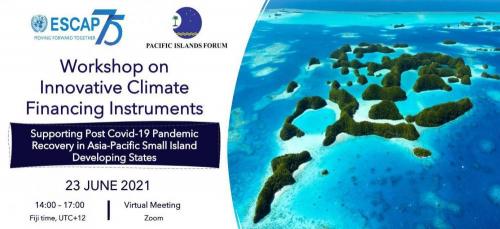
https://www.unescap.org/events/2021/workshop-innovative-climate-financin...
The investment needs to achieve sustainable development goals are substantial for small island developing States (SIDS)[1] and are likely to increase over time with climate change and the effects of the COVID-19 pandemic. The pandemic has already increased poverty, reduced Government tax revenues, and diverted Government spending to address the impacts of COVID-19; at least in the short term.[2] Thus, the ability of SIDS to mobilize and effectively utilize various sources of finance will be critical to meeting their sustainable development and climate action goals. Under the reform of the UN Development System, the Multi-Country Office Review commits the UN to strengthening policy support for financing for development and provide instruments and tools addressing the specific financing needs of countries and territories, particularly SIDS, including country case studies and subregional SDG financing workshops.
Since 2017, the United Nations Economic and Social Commission for Asia and the Pacific (ESCAP) has been working on an initiative in Supporting the countries with special needs in Asia-Pacific in meeting the challenge of resource mobilization for achieving the 2030 Agenda for Sustainable Development. The initiative aims to address and overcome the issues and the challenges by enabling selected member States to identify how to effectively mobilize and use financial resources in support of sustainable development. In November 2018, ESCAP organized a workshop in Port Vila, Vanuatu, to review the current resource mobilization situation of SIDS and identified priority areas where SIDS could encounter challenges in its efforts to raise additional resource. Climate finance was indeed identified by the workshop participants as one of the key priority areas.
Climate finance can be an important catalyst for providing and leveraging innovative sources of finance for climate change mitigation and adaption. SIDS in the Pacific have access to only about 4.6% of all the climate funds mobilized in the Asia-Pacific region.[3] Among other reasons it has been estimated that only 5% of all climate finance initiatives are dedicated to adaptation (which is most relevant for SIDS), with 95% going to mitigation.[4] Besides accessing climate funds, issuing green/sustainability bonds could be a feasible approach for raising finance to cushion the immediate effects of COVID-19 in SIDS and support sustainable development in the long-term. The recent Fiji Green Bond issue demonstrates that, if structured and managed well, it is possible for SIDS to raise significant amounts of financing through the issue of sustainability bonds.
SIDS are also among the most indebted developing countries in the world. While in the Asia-Pacific SIDS, overall debt ratios are lower than SIDS in the Caribbean and in Africa[5], these ratios have been on the rise over the last decade, partly reflecting growing external financial flows for infrastructure development and responding to constant state of recovery from climate-induced disasters, with an increasingly high risk of external debt destress. Debt-for-climate swaps, in this context, may be beneficial to SIDS that are facing rising risks of external debt distress and widening financing gaps due to the ongoing COVID-19 pandemic and the more frequent and severe climate-induced disasters, as highlighted at the 2020 Pacific Islands Forum Economic Ministers Meeting.
Against this background, ESCAP in collaboration with the Pacific Islands Forum Secretariat (PIFS) will jointly organize a virtual workshop on resource mobilization in Asia-Pacific SIDS, with a focus on how SIDS can mobilize more climate finance, either via ‘traditional’ channels or via innovative instruments such as sustainability/green/blue bonds.










Add new comment